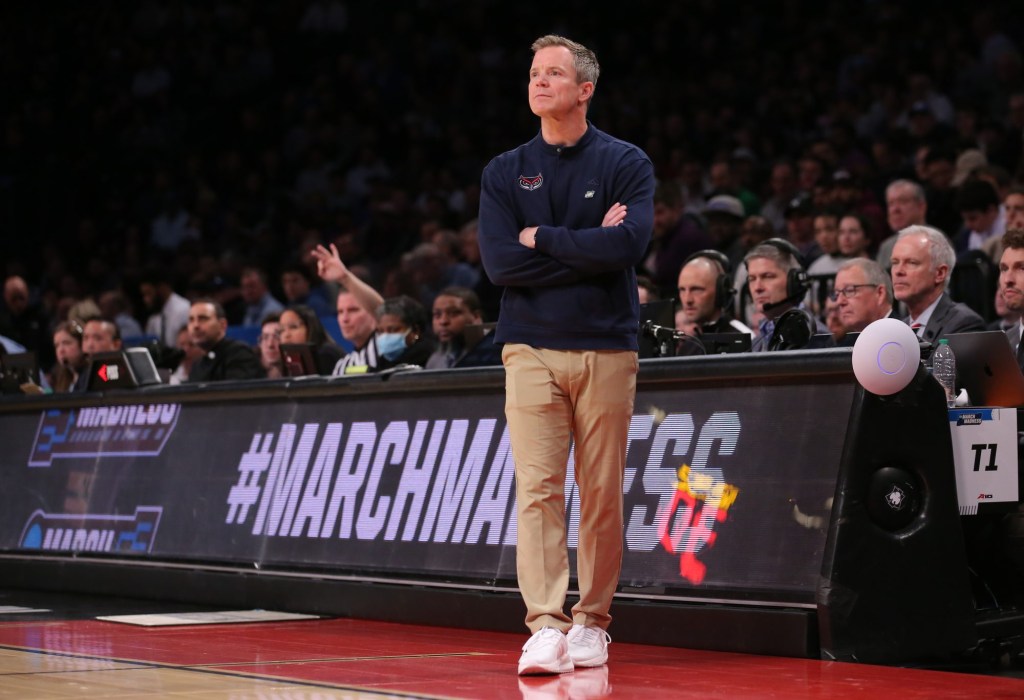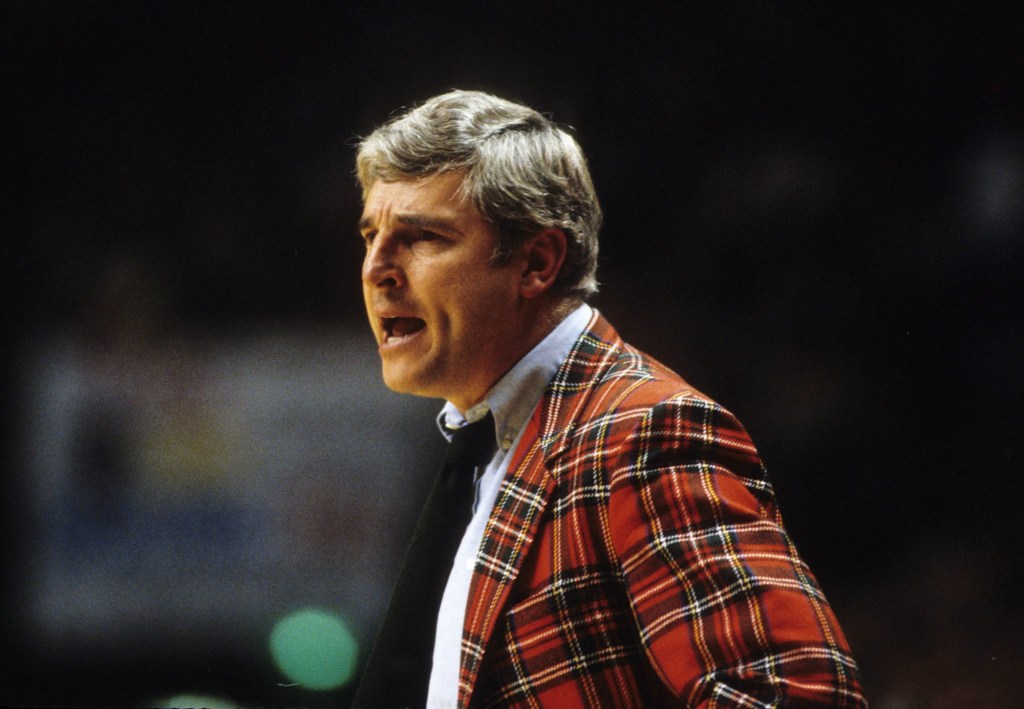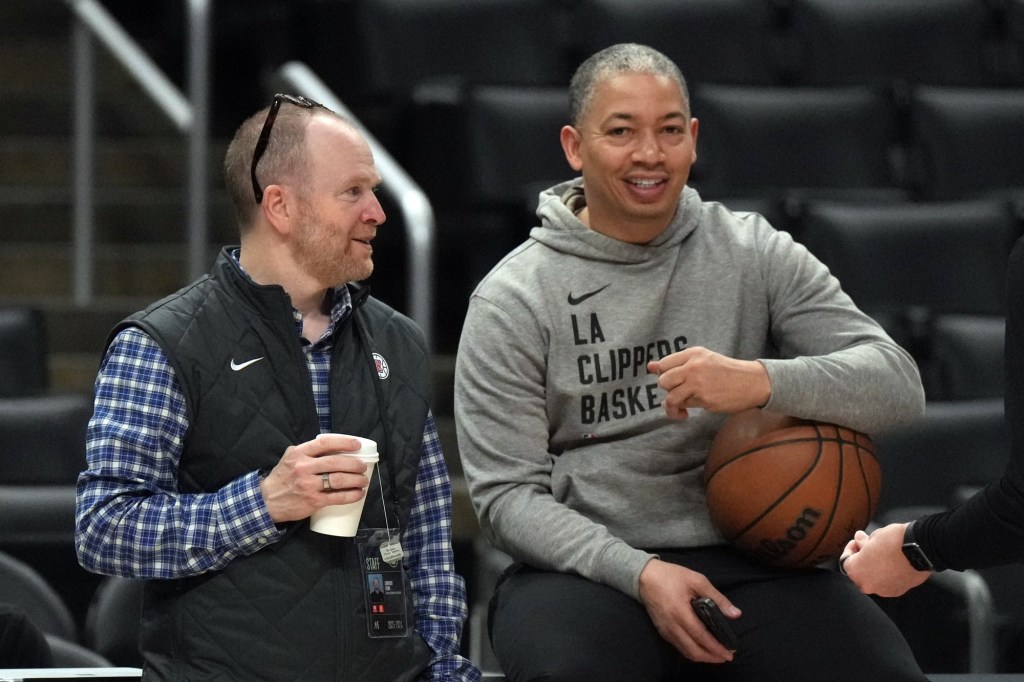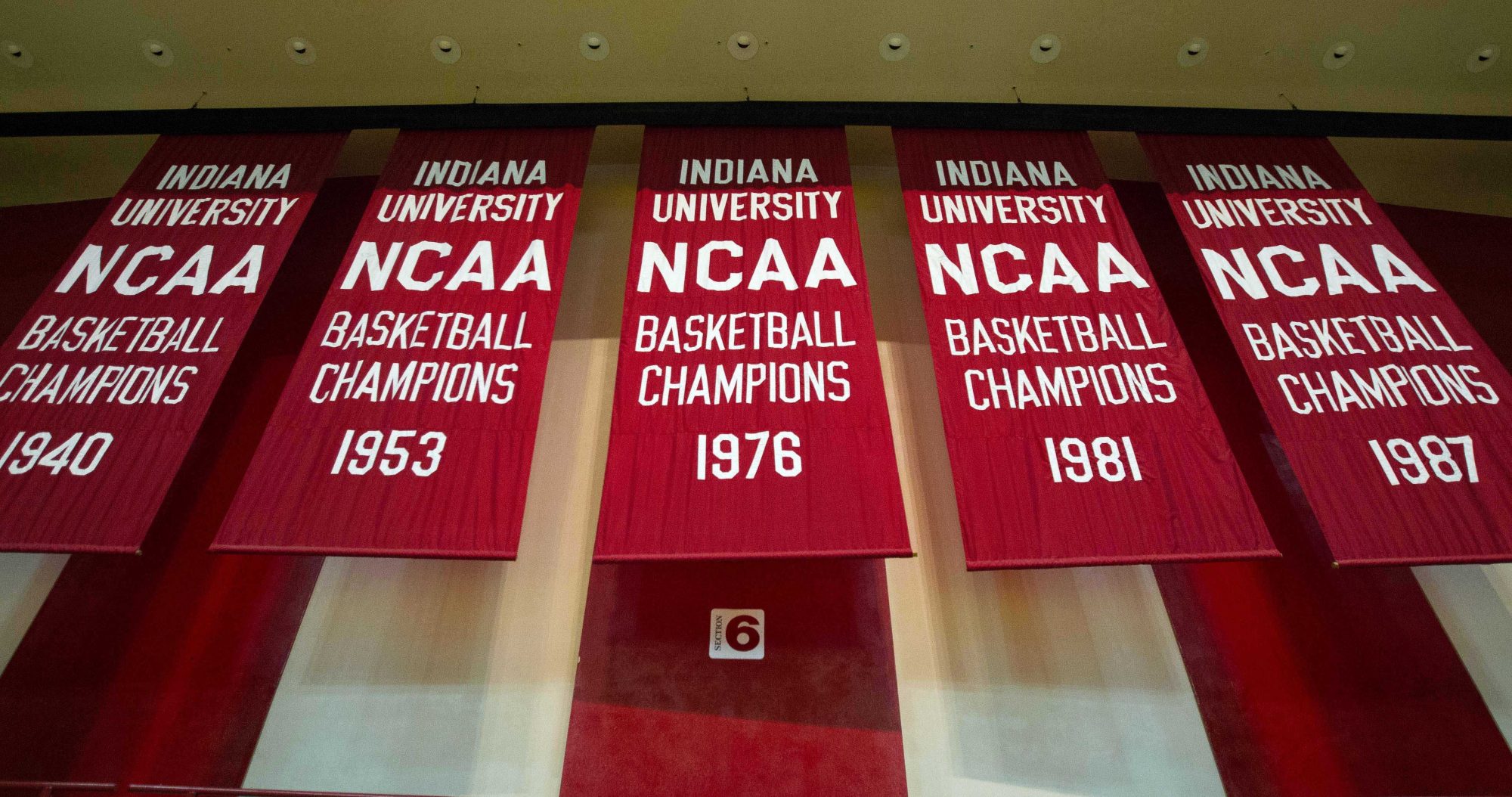Dusty May was sitting in the Dupe Room—which is what they called the film room at Indiana University—when assistant coach Ron Felling asked about his plans after graduation.
It was the late 1990s, the back end of head coach Bob Knight’s legendary run in Bloomington, and May was a junior and manager for the basketball team.
He said that he wanted to coach.
“High school or college?” Felling asked.
At the time, college coaching wasn’t on May’s radar. He wanted to be a high school coach in Indiana and live out Hoosiers. Felling’s answer changed that dream.
“He started rattling off the guys like [Lawrence] Frank who were in college and ‘this guy just got hired by the [Detroit] Pistons,’ and ‘this guy just went to Southern Miss as a [graduate assistant],’ and he went down the list and said a lot of guys in the manager program are able to go in and start a college coaching career,” May tells Front Office Sports.
Almost immediately, he went to his academic adviser to change his major from education to history, since he wouldn’t be applying to teach at high schools. He’d decided to devote himself to learning about college coaching.
One week ago, May was hired to be the next head coach at Michigan after taking Florida Atlantic—a program with no history before he got there—to back-to-back NCAA tournaments, including last season’s Cinderella Final Four run.
Indiana missed the Big Dance in 2024, and Knight died in November ’23. But decades after his prime as a coach, Knight—a man whose legacy could have been the memory of a series of incidents displaying his legendary temper—stands as one of the more directly influential figures in college basketball. There’s May, Mike Schrage—a Duke special assistant who previously served as the head coach at Elon—and Joe Pasternack, who is watching from home after guiding UC Santa Barbara to the tournament last year. All three managed together at IU before becoming head coaches. Should Duke make the Final Four, Schrage will see LJ Wright, another IU manager alum, who is the director of the men’s basketball championship.
Managers have long been among college basketball’s most undervalued and most appreciated workers, whether they’re keeping a drill going, breaking down film, or playing chauffeur for a visiting coach or scout. Under Knight, the job could include phoning the White House. Under Tom Crean, it could mean a trip to a local pet store. But regardless of the program’s on-court success, IU has been the ultimate school for managers, churning out some of the game’s best success stories. In the 20-plus years since Knight left Assembly Hall, the Hoosiers have sent dozens into pro basketball, where they’ve worked as, among other things, members of NBA front office members, agents, and coaches. The ranks include George David, the assistant general manager for the Detroit Pistons, and Ryan Carr, the vice president and director of player personnel for the Indiana Pacers.

“To spend 60 hours a week working for free you either have to be crazy or really driven,” says Steve Klei, a former IU manager who is now an assistant coach for the Atlanta Hawks.
At the top of the food chain sits Frank, godfather of the manager mafia, who, after serving as head coach of the New Jersey Nets and Detroit Pistons is now the president of basketball operations for the Los Angeles Clippers.
“L Frank was the one we all looked up to, because he moved up so quickly,” says May (above, coaching Florida Atlantic in the first round of the 2024 NCAA tournament). “His career was such a rapid ascension that there was no way we couldn’t look at that as a goal.”
Knight didn’t have to do any recruiting for his managers. The success sold itself. Both Carr and Joe Abunassar, who went on to train Kevin Garnett and Chauncey Billups, read John Feinstein’s A Season on the Brink, in which he shadowed Knight and the team for the 1985–86 season, and learned about the manager program. Carr (from Seattle) and Abunassar (Detroit) both came to IU mainly to be managers under Knight.
Frank says he wrote letters to Knight and the staff as a high school student in New Jersey—his own form of networking—then learned upon arriving in Bloomington that more than 70 students apply to become managers each year, and just four spots are available for each class. Longtime Indiana trainer Tim Garl has had a hand in almost every manager hiring since joining the program in 1981. The interview process was, and remains, serious business for a new kid on campus.
“I went to my interview and I’ll never forget this: There were like six IU staff members in half a circle and just a chair,” says Jared Mucha, a manager under Crean who is now an NBA agent for Excel. “It was very intimidating.”
In Knight’s era, managers did the equivalent of what is today a paid position. Freshmen started out with laundry and filming practice from the crow’s nest high above Assembly Hall. Wright recalls asking a senior manager whether there was a pattern for vacuuming the locker room, as if he were a baseball groundskeeper. Some managers had to drive two hours to pick up game tape-recorded on a satellite dish.
Others kept stats during practice. Knight was a huge proponent of analytics, tracking everything from post passes to hockey assists and different kinds of turnovers in practice. May says one manager would call out every stat during play while four others tried to jot them down. Experience brought responsibility, and over time, managers would get promoted to running on-court drills, note-taking during practice, and assisting coaches with game preparation. Among his peers, Frank was known for always having his note card out while shadowing Knight (below, during the 1983–84 season).
“It’s like going to a master class every day of one of the greatest teachers in the history of the game,” Frank said.

Crean took over the program when the staff included more administrative roles, but he took a similar approach to increasing managers’ responsibility as they earned it.
“You had to be as coachable as the players,” Crean says. “Everything you’re trying to do is to make them as well rounded as they can be and to give them every opportunity to really learn how to coach and learn what it takes. Not only learn how to coach but learn what the business is about.”
But the best education under Knight and Crean came when managers least expected it. Knight once approached Wright and asked him to get then vice president Dan Quayle, an Indiana native, on the phone. Knight called out the number, which Wright recited in his head. He started making his way to Knight’s office, but the coach called him back. This time, Knight said to get him a peach Nehi, his go-to beverage, while he was at it. Wright continued reciting the number. Knight stopped him again with a final request: Bring him a paper off his desk.
Somehow Wright managed to remember the phone number and bring Knight his drink and the paper without error.
“That sort of thing was one of those where I think I probably gained something from him,” Wright says.
While at the preseason National Invitation Tournament in New York City, Knight tasked Abunassar with getting subway tokens so the team could get to NYU to practice. Abunassar picked them up but was unable to deliver them in time. At practice, Knight reamed out Abunassar when he told him the elevators delayed him.
“Well, you should have f***ing parachuted down to get to us,” Knight told him.
Out of respect, Knight, known for his temper, hardly ever yelled at the managers, conscious that the work was all for free.
“What was interesting about Coach is he’d rip you, but it was almost like a sign of respect when he did that,” Abunassar said. “He kind of had an unspoken respect for us because we worked so hard, but he wasn’t going to let things slide. It was like a demand for excellence.”
Crean could be just as demanding. And his requests could be just as random. (Knight, for instance, used to ask the managers to bring him doughnuts. The result was a generation of managers who knew the bakery hours for every Big Ten college town.) Jim Harbaugh, Crean’s brother-in-law and then the 49ers’ head coach, once spoke to the team and told them to “play like vampire bats.” Crean then asked the managers whether it was possible to bring real-life bats on their road game to Purdue.
“We were at different pet stores,” says Brendon Yu, then a manager for Crean and now the Cleveland Cavaliers’ director of scouting. “People looked at us like we were crazy.”
Yu and Wright come from different eras, but both describe their managerial role as first-class education in problem-solving under pressure, which has transferred over to their current gigs—whether Yu has to make a last-minute change to a scouting trip or Wright is dealing with an unhappy coach at the Final Four. Garl said the best managers learned to anticipate every variable, from weather to injuries. “You’re never going to learn that from a textbook, but it will apply to any field you go into in life,” Garl says.
The managers weren’t their priority, but Knight and Crean showed in various moments they were paying attention. Knight hosted numerous coaching clinics at Indiana, and the managers doubled as chauffeurs, driving people such as Tony La Russa, Pete Newell, or Gil Brandt from Indianapolis to Bloomington. Knight once tasked Frank, a North Jersey native, with chauffeuring an NFL coach who went to high school six miles from where Frank attended. Bill Parcells would become a lifelong mentor to Frank and still returns calls from the Los Angeles Clippers executive for help on some of his biggest decisions.
Klei once saw the Miami Heat run a play that he thought fit Crean’s system and personnel. He drew it up and left it on his desk with a diagram and a note that said, “From Steve.” A week went by, and Crean said nothing to him. Klei thought he blew his shot. Later, at a team brunch, Crean approached him.
“Is that your play?” Crean asked. “Is that [Heat coach Erik Spoelstra]?”
“Yeah, I got it from Miami.”
“I love it,” Crean said. “Good call with this.”
Crean put the play, a dribble weave into a pick-and-roll for Yogi Ferrell, into his playbook. Klei, now on Quin Snyder’s staff with the Atlanta Hawks, recalled the interaction years later after a morning shootaround. “That’s like my ‘I arrived’ moment.”
“He’s the reason we all got jobs.”
Pasternack doesn’t mince words when describing Knight’s impact on the start of his career and how he always paid it forward. Because of Knight’s reputation both as a person and a coach, his managers were able to start their careers at bigger schools than their peers. Crean used the manager’s success as a recruiting tactic, having pictures on a wall of Frank, Carr, David, and others to show the number of decision-makers the program has in the NBA.
Frank was hired by then head coach Kevin O’Neill at Marquette without ever having met him. It wasn’t until he was with his new boss in Milwaukee a few months later that he learned why O’Neill took a shot on him.
“Coach Knight called me and said if you don’t hire this guy, it will be the worst f***ing mistake you ever make,” Frank recalls.
Former USC coach Henry Bibby told May almost the exact same thing after hiring him for a video job after his time at IU: “If you can work for Coach Knight and he speaks the way he does about you, then the job is yours unless you’re the village idiot.”
Adds May: “I don’t think that path is common for most people where you can simply get a great job just because of your association with someone. That’s a testament to their greatness and the respect level of the program.”
Crean worked the phones, too, but as a way to establish relationships, he required managers to introduce themselves to all NBA personnel when they came to watch practice. Yu says Crean was terrific at finding excuses for the managers to talk to general managers and scouts, encouraging them to do something as basic as offer water.
“I never wanted them to be in situations where they’re just walking up there to try and get a job,” Crean says. “No, you better bring some value to the conversation. And that value might be a bottle of water and a practice plan. But that value also might be a conversation with them.”
As Indiana’s managers have made their way into the working world, reciprocating has been a requirement. Frank helped get Klei a spot as a manager through a relationship with his uncle. Yu, who was a year ahead of Klei at school, helped him get his start in the NBA through an internship with the Cavs’ G League team, the Canton Charge.
For years, the manager alumni were spread out across the country, more associated with their former head coach than with the program. That has changed in recent years as Adam Howard, a current graduate assistant at IU and former manager, has sought to unite the past and present, connecting the program’s most famous alumni with its current students. Now, manager alumni regularly talk to current staff, and some opposing coaches even speak to the group before their team plays the Hoosiers. It hasn’t hurt that Indiana’s athletic director is Scott Dolson, another former manager, who has tapped into his own contacts to help bring managers back in the mix.
“Why would you not want to learn from the people who came before you?” Howard says. “I tell everyone all the time, if people see @Indiana.edu, they open it. In the basketball world they open it.”

Perhaps no one epitomizes the IU manager network more than Frank (above, left, with Clippers coach Tyronn Lue). He can discuss trades with his brethren in other front offices like David, the assistant GM on the Pistons; he might hear from May and Schrage on which college players to scout; he could negotiate with Mucha, who at Excel represents Clippers center Ivica Zubac; and he can visit Abunassar, who he hired as a manager at IU, who trained Lue as a player, and who now works out members of the current roster.
It makes for quite the line to walk between business and friendship. But Frank says it fits the nature of his job, and it helps that while they may be on opposite sides of a trade, contract, or strategy, it all comes from the same place.
“It’s all about relationships, right?” Frank says. “I think those relationships matter, ultimately what matters most is competence, trustworthiness, humility, those qualities, and I think the fact that all of us were managers and we understand what it is, we have great respect for each other because we know what the job requires. What sometimes amazes me is these same people that I’m talking to now; I’ve known this guy since I was 18 years old and I’m 53 now. And to still have a relationship and a rapport and to go back and tell some of the stories, it’s pretty incredible.”
One of Frank’s unintended impacts on his alma mater and its manager program: He’s affected applications. Both Klei and Yu say one of the reasons they went to IU is because they heard of Frank’s career origins and thought if he could go from manager to NBA head coach and now general manager, why couldn’t they?
May says Frank was the hero of many managers who came after him because he showed there was value in what they were doing, even if it was fetching Knight’s mail. Frank could push his legacy among the group if he can lead the Clippers to an NBA title, going all the way from cleaning the floors of Assembly Hall to holding the Larry O’Brien trophy. When asked about his legacy as the poster child for IU managers, Frank didn’t exactly blush.
“I would drug-test those guys,” Frank said. “I would see if they were maybe heavily inebriated when they were [saying] those things. Look, I mean it’s extremely, extremely, extremely flattering. And it’s [that] I also know that I don’t receive the opportunities I do without a ton of people who helped me every step of the way. If I helped anyone, whether it was just that they say, ‘Look if this f*** can do it, anyone can do it,’ that’s awesome. The amount of pride I have to see those guys and their success and what they’ve done is incredible. As nice of things they said about me with each of those guys, with each bit of success that they’ve had, I’m in deep admiration for what they’ve achieved.”







![[Subscription Customers Only] Jun 15, 2025; Seattle, Washington, USA; Botafogo owner John Textor inside the stadium before the match during a group stage match of the 2025 FIFA Club World Cup at Lumen Field.](https://frontofficesports.com/wp-content/uploads/2026/02/USATSI_26465842_168416386_lowres-scaled.jpg?quality=100&w=1024)
![[Subscription Customers Only] Jul 13, 2025; East Rutherford, New Jersey, USA; Chelsea FC midfielder Cole Palmer (10) celebrates winning the final of the 2025 FIFA Club World Cup at MetLife Stadium](https://frontofficesports.com/wp-content/uploads/2026/02/USATSI_26636703-scaled-e1770932227605.jpg?quality=100&w=1024)








